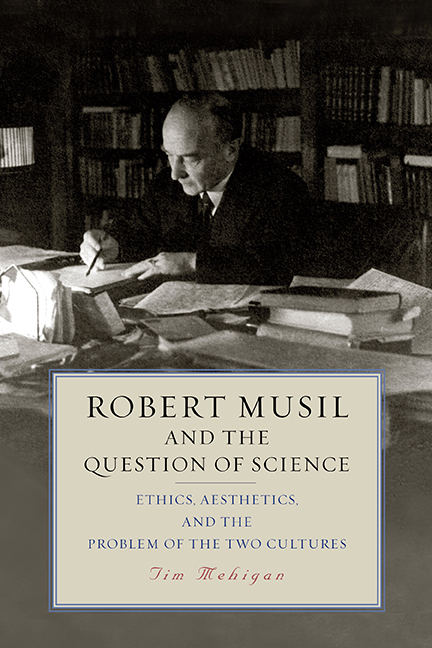Book contents
- Frontmatter
- Contents
- Preface
- Introduction: Musil’s Intellectual Position
- Part I Musil and the Two Cultures
- Part II Aesthetics and Ethics in the Context of the Two Cultures
- Conclusion: “A General Secretariat of Precision and Soul”: Ethics, Knowledge, and Literature after the Fourth Revolution 149
- References
- Index
2 - Musil, Ernst Mach, and the Problem of Causality
Published online by Cambridge University Press: 26 April 2020
- Frontmatter
- Contents
- Preface
- Introduction: Musil’s Intellectual Position
- Part I Musil and the Two Cultures
- Part II Aesthetics and Ethics in the Context of the Two Cultures
- Conclusion: “A General Secretariat of Precision and Soul”: Ethics, Knowledge, and Literature after the Fourth Revolution 149
- References
- Index
Summary
“There are objects,” he thought, “below the horizon of consciousness.
Objects that glide past, below the horizon of consciousness.
Or actually just a curious, unfathomable, potential new horizon
of consciousness, suddenly implicated, still devoid of objects.”
—UnionsIN THIS CHAPTER I consider Musil's discussion of the philosophical problem of causality. This problem loomed large in Musil's doctoral dissertation on Ernst Mach, which he completed at the University of Berlin in 1908. Causality was a litmus test for the realism of the outer world. To question the validity, or at least the verifiability, of the causal connection was to weaken ontological claims about the status of the outside world. Hume—Mach's great forebear, in this respect—had famously posed seemingly unanswerable questions about the causal connection in his Treatise on Human Nature (1739), finding in that work that causal assignations were rarely, if ever, justified. In the absence of an unimpeachable standard for causality, Hume contended, one should more circumspectly talk of “constant conjunctions” between the elements of a causal relation. In matters of causality, then, Mach was self-evidently a Humean. But Mach also went beyond Hume, calling into question a great many things that appear to be indebted to this connection or make a clear investment in it: the notion of a world of substantial things, for one thing, but also the psychic agency, subjectivity, on the basis of which assumptions about that world are advanced. If causality could no longer be defended on strict scientific grounds, Mach suggested, then neither could the instance of subjectivity nor the subjects standing behind it. With conclusions such as these in view, Mach's antimetaphysical stance was well on its way to dissolving the subject-object continuum on which the substantiality of the world was considered to rest.
What follows in this chapter is close scrutiny of such ideas as we can fairly assume Musil to have received them. The weak realism of the Machian worldview, I argue in this chapter and throughout this study, was of great importance for Musil. It paralleled Musil's own sense of being sunk in an only notionally real world.
Information
- Type
- Chapter
- Information
- Robert Musil and the Question of ScienceEthics, Aesthetics, and the Problem of the Two Cultures, pp. 32 - 50Publisher: Boydell & BrewerPrint publication year: 2020
